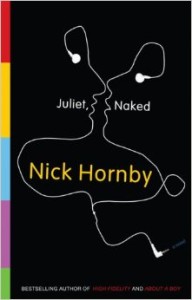This was going to be a four star book. It had it all made. I was reading dialogue out loud to my roommate and giggling along with the characters. These are usually the hallmarks of a book that I love. And it’s Nick Hornby. We had taken a break from each other in the last few years (the description of How to Be Good just didn’t catch my attention) and I was ready to fall in love again. And I did. Mostly. Is it possible to give 3.75 stars?
At the beginning of the book Annie and Duncan are in a 15 year relationship that has gone nowhere and left them both vaguely unsatisfied. Things are plodding along until there is a non-fight fight about new music from Tucker Crowe. You see, Duncan is a Crowologist and the first newly released music in 20 years by the man in question. Duncan, who has dedicated years to the study of this artist, is in rapture. Annie, who has spent her time with Duncan also vicariously having her own relationship with Tucker’s music, is not. They both post reviews to Duncan’s website which is populated by other Crowologists (of which Annie is not one) and Tucker Crowe responds to Annie, thanking her for her kind and perceptive words about the difference between Juliet his last album from the 1980s, and Juliet, Naked the acoustic version recorded at the same time and released now. As all of this is happening, Duncan and Annie stop being in a relationship with each other (he cheats, and then admits it) so Annie keeps her bit of news to herself, enjoying that she has something that Duncan does not. She is now internet pen pals with a former rock star, and her ex’s obsession.
The narrative continues on from there, and I won’t give it away any further than I have, but I think you can see where this one might be heading (and you aren’t completely wrong).
There was a lot to like about this book. I mentioned above the comedy and dialogue. However, foremost for me is Hornby’s ear for realistic word choice and thought patterns. His characters always seem real to me, even if there isn’t always a lot for me to relate to.
Here’s Annie:
For the best part of 40 years she had genuinely believed that not doing things would somehow prevent regret, when, of course, the exact opposite was true.”
“Everyone disliked their partners at some time or another, she knew that. But she’d spent her hours in the dark wondering whether she’d ever liked him. Would it really have been so much worse to spend those years alone? Why did there have to be someone else in the room while she was eating, watching TV, sleeping?
And Duncan:
He had never once felt itchy, in the way that two connecting pieces of a jigsaw never felt itchy, as far as one could tell. If one were to imagine, for the sake of argument, that jigsaw pieces had thoughts and feelings, then it was possible to imagine them saying to themselves, ‘I’m going to stay here. Where else would I go?’ And if another jigsaw piece came along, offering its tabs and blanks enticingly in an attempt to lure one of the pieces away, it would be easy to resist temptation. ‘Look,’ the object of the seducer’s admiration would say. ‘You’re a bit of telephone box, and I’m the face of Mary, Queen of Scots. We just wouldn’t look right together.’ And that would be that.”
And Tucker:
The truth about autobiographical songs, he realized, was that you had to make the present become the past, somehow: you had to take a feeling or a friend or a woman and turn whatever it was into something that was over, so that you could be definitive about it. You had to put it in a glass case and look at it and think about it until it gave up its meaning.”
So what didn’t work for me? There were too many characters to worry about. We have Annie, Duncan, Tucker Crowe, Tucker’s music and the Crowologists who study it, and Tucker’s children and exes. For a book that clocks in at 400 pages this shouldn’t be too much, but somehow it is. Because there’s at least one character that I can think of that gets such short shrift (and she shouldn’t) that it robs the final 50 pages of this book of the meaning that it was trying to get to.
Because most importantly, what’s the story really about?
Hornby doesn’t shy away from big questions, and I think that’s what gives his stories legs. Juliet, Naked is really about the way we make meaning out of art, and out of life. So, all of those characters and groups that Hornby is working with and balancing have something to add to the equation that is this novel. But that doesn’t mean that Hornby managed to balance said equation. There’s too much up front, too much on the left hand side of the equal sign and not enough after on the right hand side of the equation. There is time wasted when Tucker arrives in London, and then narrative strings left to wither and die in the final push of the book. And everything is wrapped up with a few words and no explanation of why.
Like I said, I wanted to love this book, and I did. Until I didn’t anymore.
